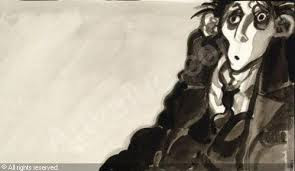Sundog Rising!
Reflections on living the life literary by the Urban Sundog
My Dismal Youth — Je Vous En Pris
So-o disillusioning!
The apparently apocryphal story I always heard ran Samuel Beckett was out walking the streets of Paris one day when a complete stranger walked up to him and for no reason knifed him in the heart. Fortunately, Sam’s overcoat was so heavy, the blade was turned aside and he wasn’t killed. An archetypical Beckettian incident in a Beckettian universe.
Well. According to Jacqueline Bograd Weld in her biography of Peggy Guggenheim which I’m presently reading, this is what really happened. Beckett had gone to the movies with some friends one evening, and …
On the way home after the standard stop in a café, Beckett and his two friends, Alan and Belinda Duncan, ran into a pimp named Prudent who worked on the avenue d’Orléans. Prudent fell into step beside Beckett, asking for money, which Beckett insisted quite honestly that he did not have. Prudent persevered, offering the services of one of his poules in return for a small loan. Beckett tried to move away, but Prudent simply grew louder and grabbed him by the arm, whereupon Beckett flung the man away, knocking him to the ground. Enraged, the pimp got up, stabbed Beckett in the chest with a clasp knife, and fled.
The knife did barely miss Beckett’s heart. Skipping ahead a bit, Weld says:
Although Beckett’s injuries were serious enough to keep him hospitalized for quite some time, when he finally recovered and appeared before the magistrate and Prudent the pimp apologized, Beckett was broadminded enough to reply, “Je vous en pris” (“Think nothing of it”).
While I don’t deny that the story as told here still lends a certain flair to Beckett’s behaviour which is rather appealing, it doesn’t have the same gripping effect the apocryphal version always did for me when I was in my late teens and early twenties.
You see, back then, in my dismal youth, I was convinced the three greatest writers of all time were Louis-Ferdinand Céline, Samuel Beckett, and Franz Kafka.
Their united European view of life as nothing better than a complete mistake and malaise suited my same opinion of the phenomenon perfectly. Céline exemplified the point of view the best, of course. I was pleased to read in Weld’s book that Beckett once shared my opinion.
In a nutshell, Louis Ferdinand Céline was a French writer who also worked as a doctor for poverty wages in a poor neighbourhood of France. He was also a condemned collaborationist during the Second World War, a presumed anti-semite, and the writer of such uplifting books as Journey to the End of the Night and Death on the Instalment Plan. I discovered him through his Castle to Castle trilogy, a nonfiction set of three books depicting how at the end of World War Two he set off on foot with his wife and cat to walk across Europe to Denmark looking for sanctuary, and how when he finally arrived, he was immediately wounded in the head and thrown in jail.
Just about summed up growing up in Charleswood perfectly, to my adolescent mind.
I don’t presume to say that my “coming-of-age” experience — God I hate that phrase — reflected the average, but I know I wasn’t alone either. What is there in a society so replete in everything a person might want such as ours that leads our youth into states of alienation so complete only the bleakest depictions of life possible seem to match their emotional states? I shake my head.
I was starting to get over it by the time I left University. The last essay I wrote before getting my degree was “The Humour of Samuel Beckett and Franz Kafka”. Part of the appeal of all three writers for me was that on a certain level, they all got the joke.
But reading Weld’s book today reminds me of the time when I thought Beckett’s pov was the only one that made sense, especially when events unfurl as randomly as I always thought the knife attack Sam suffered was. In fact, that event ended very well for Beckett. A passing nurse, Suzanne Dechevaux-Dumesnil, rushed over to save his life. Beckett and Suzanne spent the rest of their lives together, eventually marrying in the early 60s.
As I read the genuine account of the knifing, it occurred to me that now that I’m older and have been through more than a few genuine wringers in life myself, you’d think I’d be more amenable now to the approach to life Beckett, Céline and Kafka offer so graphically, and that I embraced so eagerly when I was too young to know any better.
But, nah. Now that I’m old and relatively content, I find Sam’s statement in court regarding his attacker more apropos.
Je vous en pris.
*****
Photography by Renee Beaubien, at Beyond the Prism
on Flickr, at:
https://www.flickr.com/photos/128997372@N08/
*****
Artists Worth A Look!
Terrific interview with musician Jill Tracy by Eddie Muller of the Film Noir Foundation:
“Where Shadows Fall: Jill Tracy talks to Noir City Magazine”
http://jilltracy.com/jt/uncategorized/where-shadows-fall-jill-tracy-talks-to-noir-city-magazine/
*****
REALITY FICTION AND BEYOND!
The Big Mosquito continues, with Instalments 16 and 17 of 49 going up Monday September 28th and Friday, October 2nd. As always, at:
http://realficone.blogspot.ca/
Kent Wesley returns, Jason defines Morpheus Interruptus, and everyone gets a good night’s sleep. Sort of.
Featuring:
26. glad I had that drink
27. the nearest bed
28. or sofa
29.
30. senseless diary
31. padding
Sink Decomposition Series
by Fandango Moberly
#18 of 50
The mounting tension! The Green Spatula is gone! The whole colour scheme is changing! Red is peeking through! What’s next? What’s next? The Slotted Spoon? The Slotted Spoon?











No comments:
Post a Comment